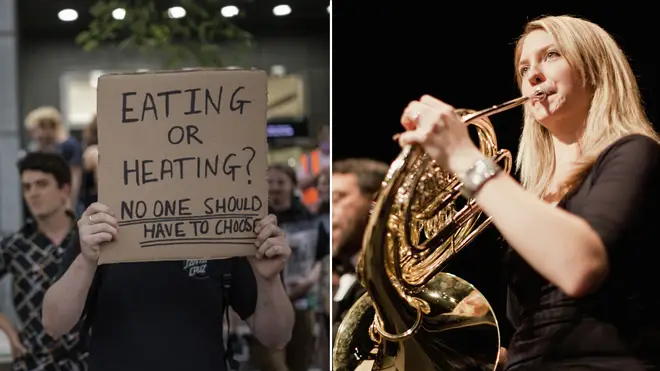90 percent of musicians are worried about affording food due to the cost of living crisis
23 November 2022, 10:47 | Updated: 29 November 2022, 10:49

After two years of Covid-19 lockdowns, navigating Brexit red tape, and now a cost of living crisis, the music industry is living through one of its toughest periods to date.
Listen to this article
With Christmas just around the corner, this has historically been a lucrative period for those working in the arts industries.
But over the last two years the festive season has been anything but reliable, as the music industry has had to endure lockdowns, Covid cases, and a disruption to freedom of movement. And now, the cost of living crisis is making its mark on the country’s arts scene.
Last week, the government announced that the UK had entered a recession for the first time since 2008. According to the charity Help Musicians, the ‘cost of living crisis’ has meant that more than half of the musicians in the UK are concerned they’ll be forced to leave the industry.
Classic FM spoke to classical music venues and ensembles to learn how the the music industry is struggling to keep their heads above water this winter, and whether there is a light at the end of the tunnel.
Read more: Classic FM partners with Wigmore Hall to offer £5 tickets to under-35 audiences
The cost of living, the ongoing impact of the pandemic, Brexit, and personnel and venue shortages are creating a perfect storm of issues for the UK’s musicians.
— Help Musicians (@HelpMusicians) November 14, 2022
Today we set out our response to the unique set of challenges facing musicians this winter.
🔗https://t.co/tgLnzuQo5J pic.twitter.com/LQquaYarR8
The cost of living crisis is negatively impacting musicians ‘more than the pandemic’
Help Musicians CEO, James Ainscough, has described the current environment for musicians as “brutal” and believes that now is the toughest time it has been to be a musician since the Second World War.
In a recent survey, the UK charity found that 98 percent of musicians are concerned about earning enough income over the next six months, and 90 percent are worried about being able to afford food
60 percent of musicians also told the charity that they are earning less than they were in 2021, suggesting that the cost of living crisis may be impacting them financially more than the pandemic.
The following challenges are having a severe impact on their mental health, with 88 percent saying their poor mental health is currently negatively impacting their career.
Read more: New report warns of ‘talent exodus’ in classical music, as parents and carers struggle
Hundreds of union members from the MU, @EquityUK, @bectu, @TheWritersGuild, @PCSCultureGroup and more are here outside @DCMS this morning to protest cuts to arts funding.
— Musicians' Union (@WeAreTheMU) November 22, 2022
These cuts put jobs at risk during a cost of living crisis. https://t.co/YEVEgcWjAC pic.twitter.com/gLadkGIX0m
Artists have also been found to be in a 'cost of working' crisis, with 91 percent unable to afford music equipment, whilst energy and fuel costs are making travelling to concerts and heating rehearsal spaces impossible for many.
In response to the “unique set of challenges facing musicians this winter”, Help Musicians have published advice on managing finances, developing a career, facing financial crisis, touring, and managing mental health.
Concern is echoed across the industry. Earlier this month, Naomi Pohl, general secretary of the Musicians’ Union said in an interview for PRS for Music: “We’re at another moment when the industry needs to pull together.
“We were joined up during the pandemic and we again need to make sure there’s additional support for musicians who need it, otherwise there’s a risk of a talent drain.”
The Musicians Union’, along with other unions, gathered outside the Department for Digital, Culture, Media and Sport (DCMS) on Tuesday 22 November to protest cuts to arts funding. The unions have argued that the cuts put musicians’ jobs and livelihoods at risk, during a cost of living crisis.
Read more: ENO chorus sing ‘You’ll Never Walk Alone’ outside Arts Council office as 300 jobs at risk

Members of the ENO Chorus sing ‘You’ll Never Walk Alone’ outside Arts Council England’s London office
‘Our energy costs have gone up by 250 percent’
Central London church, St-Martin-in-the-Fields, is an 18th-century building that also functions as a classical and jazz music venue, attracting audiences of tourists and locals alike. Its tourist audience has shrunk over the last two years due to the impact of Covid and a decline in travel and tourism, but the cost of living crisis brings another new challenge to the venue.
Chris Denton took over as CEO of St Martin’s in May 2021, leaving his role as executive director of audiences at the Southbank Centre. “We’ve got this issue of audiences who have been reluctant to come back following Covid-19,” Denton told Classic FM.
“Because of Covid-19 fear, we’ve got the issue of tourism in London not having bounced back, so that’s already a downer on classical music audiences returning.
“The cost of living crisis really adds another dimension to the problem, and it is so unwelcome for all of us in terms of the fragility of the recovery from Covid.”
Read more: The King’s Singers perform ‘Greensleeves’ with sublime harmonies in St Martin in the Fields

SHELTER - Jan Willem de With feat. Laura Ayoub and Sarah Ayoub | Trailer | Help Musicians
Denton continued: “Over the last year, our energy costs have gone up by 250 percent. We’re a church, and like a lot of older buildings, very expensive to heat.”
For Denton, dealing with these rising bill costs is “a careful balance of trying to maximise people coming through the door, without overpricing things and putting them off,” which it seems he has been successful in.
Denton said the cost of living crisis has “hugely” impacted St Martin’s, from the programmes they decide to present, to their pricing strategy.
“There’s this question of whether or not audiences are prepared to be risky with their ever decreasing disposable income and actually thinking what, what might they want in order to entice them to come out. There’s lots of different issues that we’re thinking through because of this current crisis.”
And he’s not alone with centring the needs of the audiences – balancing what they want to see and what they can afford, while still upholding the values the concert venue wants to try and deliver in terms of the artistic offer.
Dougie Scarfe, chief executive of the Bournemouth Symphony Orchestra told Classic FM that the orchestra is “doubling down” in its efforts to ensure audiences can access their various discounted ticket schemes for students, children, and people on Job Seekers Allowance.

The King's Singers perform 'Greensleeves' at a central London church
The Bournemouth Symphony Orchestra is Classic FM’s Orchestra in the South of England, and covers an impressive 10,000 square miles of the southwest of England.
As well as in-person shows, the southern orchestra is one of the few ensembles to have continued their ‘on-demand’ video and livestream output since the end of the pandemic.
For Scarfe, it’s important to consider the cost it takes to get to the venue, on top of the ticket price. “With our livestream concerts actually being live, if you live 100 miles or 200 miles away from the concert hall, or you can’t get a local transport to our venue, you can still share in that live experience with our presenters and musicians.
“We’ve got audiences who have had their dinner, opened a bottle of wine, some of them get dressed up into the lounge where they sit watching the concert on their computers, or on their TV, and still are able to share that live experience. And I think in times like these, our role bringing music into people’s lives is actually never more important.”

For audience members who are coming out to see concerts, the BSO has deals with local restaurants so guests are able to make the most of their ‘night out’.
Scarfe says that this is what people missed during the pandemic. “That feeling of being with other people who are having a great time, whether that’s in the theatre, whether that’s football, or in the concert hall.
“I think there’s a genuine desire within audiences to come back. And if we can help this by making it as affordable as we can, with ongoing concessions, and live streams to make the experience more accessible, then that’s what we’re going to do.
“A fundamental thing to human life is to have that shared experience, and by putting all those things together with all the offers and all the deals, we can help out audience have a really fantastic night out.”
Read more: Bournemouth Symphony Orchestra celebrated by G7 ministers for pioneering pandemic times concerts
‘The crisis is forcing people to think twice before buying concert tickets’
Jon Collins, CEO of Live, a group that represents the UK’s live music business, said in a statement: “While we welcome the government’s desire to bring stability to the UK economy, today has offered little help to secure the future of our £4.5 billion industry and the 200,000 people it employs.
“Unprecedented operating conditions are pushing our sector to the brink, as much-loved venues close their doors, tours are cancelled and artists drop out of the industry.”
Simon Eaton, Head of Live at the Troxy theatre in London, told Classic FM, “The cost of living crisis is forcing people to think twice before purchasing tickets for concerts. Not only having to account for the price of the ticket itself but also the night out that comes with it – travel, food, drinks – which are all on the up.
LIVE's CEO, Jon Collins, reacts to the Autumn Statement👇 pic.twitter.com/BXE4K0nd3T
— LIVE (@LiveMusic_UK) November 17, 2022
“We’re certainly seeing people drinking less at shows which for a venue is difficult as it’s our major source of revenue. Unfortunately, the same crisis is affecting artists too.
“Touring is more expensive than ever before and as result ticket prices are going up which leads back to people being unable to purchase them and a negative cycle created.”
In response to the Autumn budget, the Independent Society of Musicians noted that the statement did not provide targeted support for the music industry.
If you or someone you know in the music industry needs help finding crisis resources, visit Help Musicians for further sources of support


































